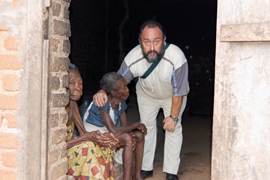|
Rebels harass and plunder in the Central African Republic "The plundering continues, day and night, at any time. The terrified people do not flee, but weep, and try to defend the little they still have." This is how a local Catholic leader described the situation in the east of the Central African Republic, following the coup on March 24 and the arrival of rebel forces in his diocese. Bishop Juan José Aguirre, Comboni missionary and Bishop of Bangassou, made his comments to international Catholic pastoral charity Aid to the Church in Need (ACN).
The list of objects and vehicles stolen from houses belonging to the Order and Church properties is, he said, immeasurably long. "The Spiritans individually went from house to house or sought refuge with friends because they were awakened two nights in succession by axes and machetes,” Bishop Aguirre continued. “They have even tried to abduct Sisters of the Order from their houses. The plundering is generally widespread.” The Comboni missionary said this situation prevailed in the Central African Republic for months but that it worsened in his diocese on March 11 with the arrival of the "Séléka" in Bangassou. According to Bishop Aguirre, "The Séléka are mainly from Chad or Sudan or young men recruited at the last minute to reinforce the troops. Neither group is interested in the country; they are only interested in the booty." Séléka means union in the local Sango language. It brings together around 5-6 rebel groups of Muslim origin. They have seized power and, on March 24, during the Palm Sunday celebrations, deposed President Bozizé at the capital Bangui. Bishop Aguirre happened to be in Bangui on that day, and he described his experience. "While we were celebrating Palm Sunday Mass, firing with heavy artillery and submachine guns began at 7.55 am and lasted for three hours. We live next to the presidential palace, so that we were in the thick of the fighting.” “A group of Séléka, composed partly of various groupings from Chad and Janjaweed from Sudan, forced their way heavily armed into Bangui Cathedral just as the Mass was ending. The rebels began to fire into the ceiling. People threw themselves to the floor, onto the palm leaves. They were forced to hand over the keys for cars and motorcycles parked outside...” “Firing continued until every last key had been surrendered. The children were crying in terror.” The bishop also describes how he celebrated Holy Week in his Diocese of Bangassou, to the east of the capital: "In Rafai, the Easter Triduum was very hectic. The risen Christ is triumphant, but He always shows the Apostles His wounds.” “Around 20 bandits disguised as Séléka captured the village and the mission. No-one was hurt. The Muslims from the region intervened to see off these 20 street robbers." In the midst of chaos and suffering the Church spares no effort to be with the people: "In Tokoyo, not a single car or motorcycle remained. All the same, there were 40 chapels to look after.” “Father Agustín from Bakouma traveled 60 km on foot to Zabe with one of the Sisters of the Order to celebrate Easter. As long as the stars are visible, we can go on foot, even at night." For the missionary, the arrival of the Islamist Séléka militia is a further chapter in the turbulent history of the former French colony. For more than 20 years civil war has raged in a country which is the second-poorest in the world. The bishop closed his account with the words: "When there is no hope, we can only hope that hope will be restored." Since 2002, Aid to the Church in Need (ACN) has been supporting 240 projects in the Central African Republic to the tune of over $3.2 million. The aid has been used to safeguard the existence of priests, purchase cars and motorcycles, support pastoral work and various construction and further training measures. Other support has included grants to 15 scholarship holders who completed their postgraduate studies in Europe. |
|
|

 “Rebels or people disguised as rebels can break into…homes at any time and rob them, armed with submachine guns,” wrote the bishop.
“Rebels or people disguised as rebels can break into…homes at any time and rob them, armed with submachine guns,” wrote the bishop.